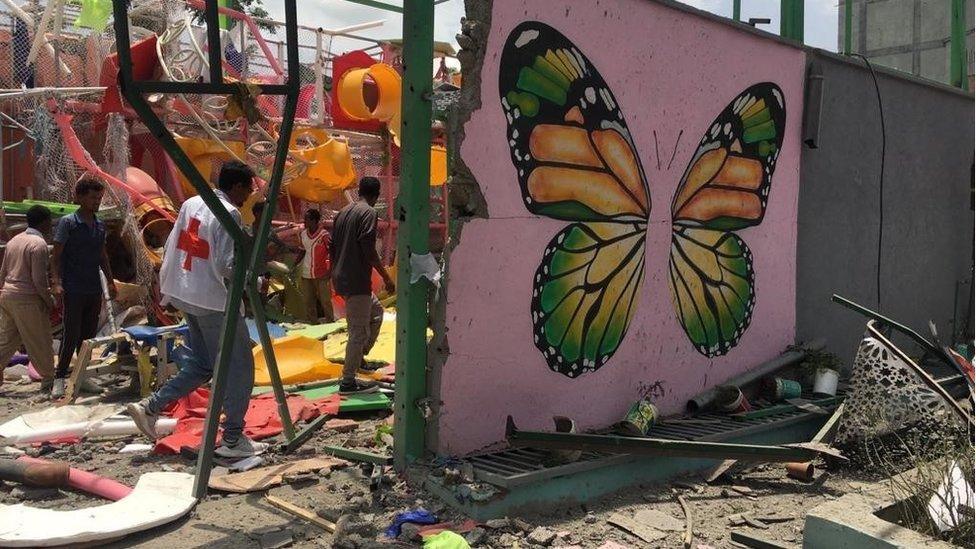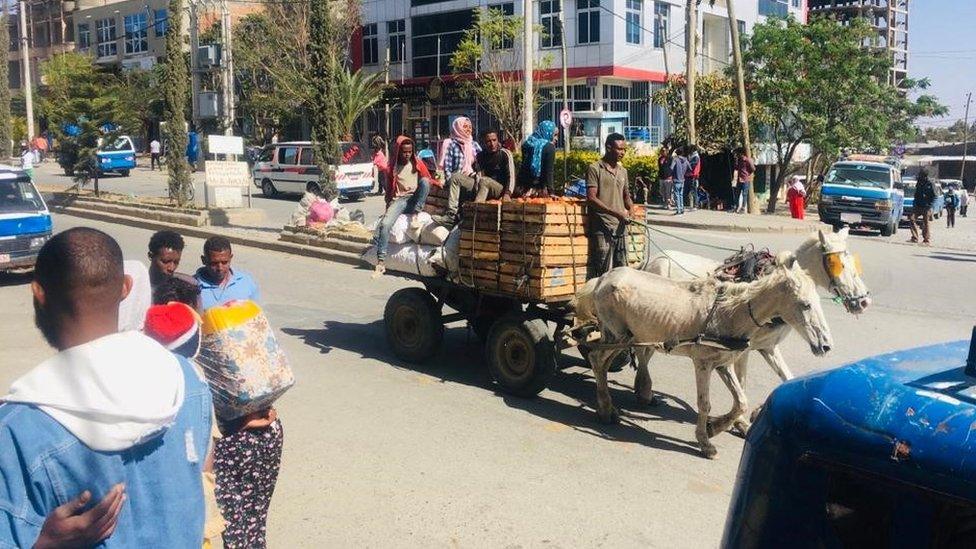Ethiopia's civil war: Inside Tigray's capital Mekelle
- Published

As the war in Ethiopia's Tigray region escalates once more, civilians are increasingly becoming involved in the fighting.
Tigray rebel commanders have embarked on a new recruitment campaign, having previously been accused of forcing people to join the war effort, external.
Similar accusations have been levelled against Eritrea, which has entered the war on the side of Ethiopia's government.
The BBC has received an exclusive report from a journalist in Tigray's capital, Mekelle, on how residents are coping.

Drones fly over the skies of Mekelle, which has a population of around 500,000, almost every day. I can hear one now as I write this article. It makes me feel very insecure. In the last few weeks airstrikes have hit playgrounds and residential areas - it is not clear what the targets were.
This week the Tigray army called on every able-bodied person to join the fight - and as war-weary as people are after 23 months of violence, they are taking up the call.
"It is considered taboo not to join the military," says a resident, whose name the BBC is withholding for safety reasons.
Many Tigrayans remain defiant, saying they will no longer accept federal rule, while Ethiopia's Prime Minister Abiy Ahmed accuses the region's leaders of rebelling in a bid to regain the power they lost when he took office in 2018.
Everyone here wants to defend their rights. The latest surge in violence started in late August after the collapse of a five-month-long humanitarian truce.
People from all walks of life, including women and young people, are answering the call to join the army of the Tigray People's Liberation Front (TPLF).
Women have received military training, and say they are ready to fight if called up.
They include a 23 year old who told me she was "proud to be Tigrayan and excited to have been trained to protect my rights and preserve my land".
Watch: How Ethiopia's civil war in Tigray started
Tigray has been under a blockade since June 2021, and living conditions have been steadily worsening.
It's now been more than a year since telephone lines and internet services stopped, disconnecting us from the rest of the world.
People have gone back to using paper to write messages to their families and friends - or they go to the border with Ethiopia's Amhara region to make calls and receive money from relatives abroad.
Groups gather round a single radio on the side of the road to find out what's happening. Everyone talks about the peace process and follows attentively the news about that but many people here believe that the Ethiopian government isn't ready for peace talks, because they have not stopped bombing.
People here cannot make money, or withdraw cash from banks because they have been closed. So businesses are not functioning.
It has led to the emergence of open-air markets, which were illegal before the war, and the movement of cash through the black market, with brokers charging a commission of at least 30%, down from 50% a few months ago.
My own neighbours live on money sent by their family in the US and Canada.
One of the neighbours says he can't feed his five children if they don't send cash. He has two sisters in the US, and he has received money from his siblings four times since the start of the siege.
The conflict has prevented essential goods, including fuel, from reaching Tigray. Many people go around on foot, or in donkey carts.

Mekelle has been cut off from the rest of the world
Prices keep increasing. Teff, the grain we commonly use to make the traditionally baked bread known as injera, goes up every week. The current price of 100kg (220 lb) is around $265, compared to $85 a year ago.
People are dying due to a lack of medication that can't be brought in because of the siege. The cost of medicines for chronic diseases has increased tenfold.
As every new airstrike kills more civilians, more young people are driven to join the military.
A 29-year-old woman told me that three of her family members - two brothers and a sister - have now joined the Tigray army.
For the past two months she has been spending her time, and using the little she has, to prepare food for fighters on the frontline.
Other residents are sharing their food with the families of those who've gone to fight.
When news broke last week that African Union-brokered peace talks could start in South Africa, people were happy.
But the talks failed to get off the ground for reasons that are unclear. Many here are just desperate for peace and churches and mosques are full every night, with people praying for this war to end.
The BBC has withheld the name of the journalist and interviewees for their own safety.
